Last week, i went to RCA’s research biennial. It was called Disruption, lasted a few days only and you shouldn’t be too sad if you missed it. Many of the works lacked any kind of description or explanation so i wasn’t really able to assess their quality. That said, a few pieces made it worth the trip to the College. First of all, the gigantic banner ‘The Market Will Save Us’ by Bill Balaskas hanging on the facade of RCA’s Kensington building. The work is a comment on the impact of funding cuts on the cultural sector and the subsequent dependency on corporate sponsorship. Curbing artistic expression, and having to think about ‘what you do and what you say’ is effectively a form censorship, Balaskas explained.
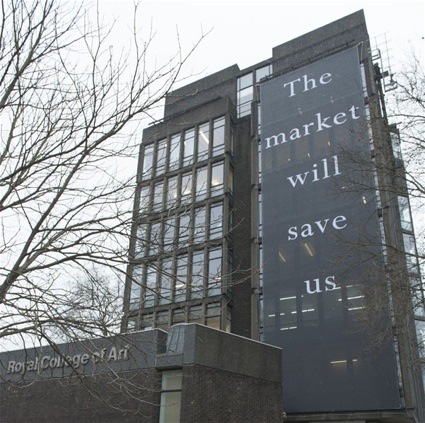 Bill Balaskas, The Market Will Save Us. Photograph by Dominic Tschudin
Bill Balaskas, The Market Will Save Us. Photograph by Dominic Tschudin
The other work that saved the show for me was Austin Houldsworth‘s Crime Pays. The work explores one of your bank’s most cherished dream: an entirely cashless society. Phone and card transactions might be on the rise right now but paper and coins will be difficult to replace. People are afraid of safety, fraud, breaches in privacy (electronic payments track and detail all our transactions and therefore define an outline of who we are as individuals. Even readers of the Daily Fail know that.) But the reason why governments would also like to see the end of cash is that it is the currency of the black economy which is estimated to have a total worldwide value of 1.82 trillion dollars. In Italy, for example, the black economy is thought to be 27pc of GDP. Although it is much lower in the UK, the government spends 20 to 40 billion per year combating organised crime and the black market in the UK is estimated to total 60 billion.
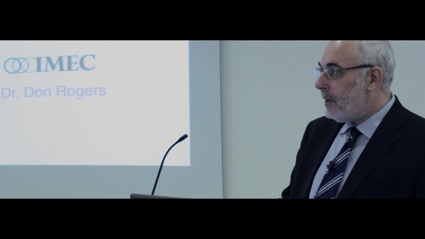 Presentation of Crime Pays at the British Computer Society
Presentation of Crime Pays at the British Computer Society
Austin managed to convince one of the organisers of a conference at the British Computer Society to present the fictional monetary system as if it were a real scheme. Dave Birch, director of Consult Hyperion played the part of Dr. Don Rogers.
The Crime Pays system is a completely electronic payment system, in which all financial transactions are open. Only paying for the privilege of privacy will ensure a transaction is hidden from public view. Which means that anyone has the opportunity to chose whether they want to make a transaction anonymously or openly. By default your spending will be open and all transactions will be tracked by your bank as they are now. If you’d rather keep the spending secret, then a small fee will be levied and it will go to the government, but you can decide to which budget (health, education, etc.) the money will be assigned to. Even if the tax is has high as 20% of the transaction, the amount will still be fairly low considering the costs already incurred by the government and taxpayer.
Is privacy within our finances a matter of personal liberty or simply the harbourer of criminality?
 A member of parliament commits her future to open and honest dealings, by destroying her dark cards during a press conference. Photo by Roel Paredaens
A member of parliament commits her future to open and honest dealings, by destroying her dark cards during a press conference. Photo by Roel Paredaens
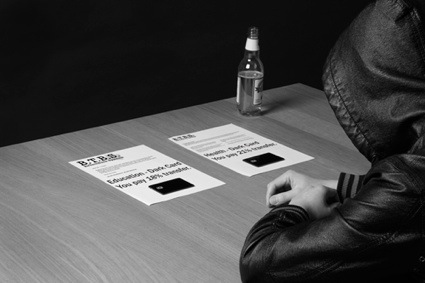 A dealer decides which government department he wants to fund. Photo by Roel Paredaens
A dealer decides which government department he wants to fund. Photo by Roel Paredaens
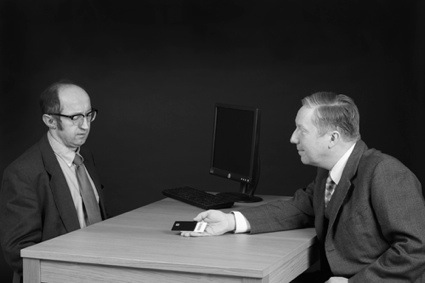 A businessman reluctantly offers a ‘gift’ to seal a desperately needed contract deal. Photo by Roel Paredaens
A businessman reluctantly offers a ‘gift’ to seal a desperately needed contract deal. Photo by Roel Paredaens
Unsurprisingly, i had a couple of questions for Austin (who’s also inviting submission for a competition to design a future financial crime):
Hi Austin! Have you thought about what criminals would try and do to avoid paying for privacy?
In order for the system to work criminals would need to trust the payment method. This might only be achieved if the law was changed to discount any evidence in court that was linked to the use of the ‘dark exchange’ system.
If criminals subverted the system, I believe they would either use an alternative method of exchange (if available) or use the ‘open exchange’ and simply attempt to hide in ‘broad daylight’. Shadowing the buying and selling patterns of the average 9 to 5 worker, but this would lead to new validation methods during the purchase of services and goods.
This scenario is plausible only in a cashless society, right?
Yes, the functionality that electronic hardware can deliver is key to the systems operation. But aspects of this system are already used today, for example; seized proceeds from organised crime are often fed back into the local community that were affected by the illegal activities.
And solely in the UK or would the scenario have to be implemented on a world scale?
Practically speaking the test would need to be based within a small country and then moved to a larger scale if successful. Originally I imagined this type of system would be best suited to tax havens like ‘Luxemburg’ or the ‘Isle of Man’. Dark payments would give money launders a relatively low level of taxation at the same time as generating some income for the local government.
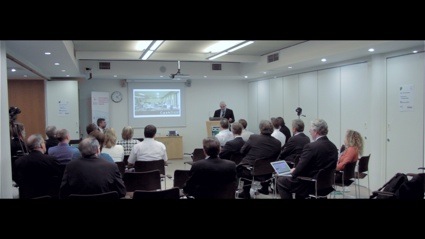 Presentation of Crime Pays at the British Computer Society
Presentation of Crime Pays at the British Computer Society
Did someone tell the audience at the end of Dr. Don Rogers presentation that it was all a fake? Did they think that the scenario was plausible?
Dr. Don Rogers aka Dave Birch is well known in the digital payments industry; so some people within the audience already guessed he was presenting a speculative proposal. Our intention wasn’t to fool people but to present a scenario, which wasn’t easily dismissed as too abstract or extreme. Therefore the expert audience never questioned the reality of the system and only asked questions within the boundaries of the proposal.
Also i was wondering who would control the scheme? Mostly the banks or the government?
I think the people who use the system are the ones ultimately in control; the banks would provide the services and the government would sanction the system but if its not beneficial for the people, then eventually the system is destine to collapse.
Thanks Austin!
